- Home
- Jasper Fforde
The Well of Lost Plots Page 5
The Well of Lost Plots Read online
Page 5
'Keep going!' shouted the soldier. 'And don't stop until I say!' He let go another burst of fire, took out the spent clip, knocked the new magazine on his helmet, reloaded and fired again.
'That wasn't how it happened—!' I muttered aloud, the soldier having gone way over his allotted time and word count. I looked at the bloodied hand that had fallen against me. A feeling of dread began to gnaw slowly inside me. The fuel gauge was still intact – shouldn't it have been shattered when the soldier was shot? Then I realised. The soldier had survived and the officer was dead.
I sat bolt upright in bed, covered in sweat and breathing hard. The strength of the memories had lessened with the years but here was something new, something unexpected. I replayed the images in my head, watching the bloodstained hand fall again and again. It all felt so horribly real. But there was something, just there outside my grasp, something that I should know but didn't – a loss that I couldn't explain, an absence of some sort I couldn't place—
'Landen,' said a soft voice in the darkness, 'his name was Landen.'
'Landen—!' I cried. 'Yes, yes, his name was Landen.'
'And he didn't die in the Crimea. The soldier did.'
'No, no, I just remembered him dying—!'
'You remembered wrong.'
It was Gran, sitting beside me in her gingham nightie. She held my hand tightly and gazed at me through her spectacles, her grey hair adrift and hanging down in wispy strands. And with her words, I began to remember. Landen had survived – he must have done in order to call up the air strike. But even now, awake, I could remember him lying dead beside me. It didn't make sense.
'He didn't die?'
'No.'
I picked up the picture I had sketched of him from the bedside table.
'Did I ever see him again?' I asked, studying the unfamiliar face.
'Oh, yes,' replied Gran. 'Lots and lots. In fact, you married him.'
'I did, didn't I?' I cried, tears coming to my eyes as the memories returned. 'At the Blessed Lady of the Lobster in Swindon! Were you there?'
'Yes,' said Gran, 'wouldn't have missed it for the world.'
I was still confused.
'What happened to him? Why isn't he with me now?'
'He was eradicated,' replied Gran in a low voice, 'by Lavoisier – and Goliath.'
'I remember,' I answered, the darkness in my mind made light as a curtain seemed to draw back and everything that had happened flooded in. 'Jack Schitt. Goliath. They eradicated Landen to blackmail me. But I failed. I didn't get him back – and that's why I'm here.'
I stopped.
'But … but how could I possibly forget him? I was only thinking about him yesterday! What's happening to me?'
'It's Aornis, my dear,' explained Gran, 'she is a mnemonomorph. A memory-changer. Remember the trouble you had with her back home?'
I did, now she mentioned it. Gran's prompting broke the delicate veil of forgetfulness that cloaked her presence in my mind – and everything about Hades' little sister returned to me as though hidden from my conscious memory. Aornis, who had sworn revenge for her brother's death at my hands; Aornis, who could manipulate memories as she chose; Aornis, who had nearly brought about a gooey Dream Topping armageddon. But Aornis wasn't from here. She lived in—
'—the real world,' I murmured out loud. 'How can she be here, inside fiction? In Caversham Heights of all places?'
'She isn't,' replied Gran. 'Aornis is only in your mind. It isn't all of her, either – simply a mindworm, a sort of mental virus. She is – resourceful, adaptable and spiteful; I know of no one else who can have an independent life within someone else's memory.'
'So how do I get rid of her?'
'I have some experience of mnemonomorphs from my youth,' replied Gran, 'but some things you have to defeat on your own. Stay on your toes and we will speak often and at length.'
'Then this isn't over yet?'
'No,' replied Gran sadly, shaking her head, 'I wish it were. Be prepared for a shock, young Thursday – tell me Landen's name in full.'
'Don't be ridiculous!' I scoffed. 'It's Landen Parke—'
I stopped as a cold fear welled up inside my chest. Surely I could remember my own husband's name? But try as I might, I could not. I looked at Gran.
'Yes, I do know,' she replied, 'but I'm not going to tell you. When you remember, you will know you have won.'
5
The Well of Lost Plots
* * *
'Footnoterphone: Although the idea of using footnotes as a communication medium was suggested by Dr Faustus as far back as 1622, it wasn't until 1856 that the first practical footnoterphone was demonstrated. By 1895 an experimental version was built into Hard Times, and within the next three years most of Dickens was connected. The system was expanded rapidly, culminating in the first trans-genre trunk line, opened with much fanfare in 1915 between Human Drama and Crime. The network has been expanded and improved ever since, but just recently the advent of mass junkfootnoterphones and the deregulation of news and entertainment channels have almost clogged the system. A mobilefootnoterphone network was introduced in 1985.'
UA OF W CAT – The Jurisfiction Guide to the Great Library (glossary)
Gran had got up early to make my breakfast and I found her asleep in the armchair with the kettle almost molten on the stove and Pickwick firmly ensnared in her knitting. I made some coffee and cooked myself breakfast despite feeling nauseous. ibb and obb wandered in a little later and told me they had 'slept like dead people' and were so hungry they could 'eat a horse between two mattresses'. They were just tucking in to my breakfast when there was a rap at the door. It was Akrid Snell, one half of the Perkins & Snell series of detective fiction. He was about forty, dressed in a sharp fawn suit with a matching fedora and with a luxuriant red moustache. He was one of Jurisfiction's lawyers and had been appointed to represent me; I was still facing a charge of fiction infraction after I changed the ending of Jane Eyre.
'Hello!' he said. 'Welcome to the BookWorld!'
'Thank you. Are you well?'
'Just dandy!' he replied. 'I got Oedipus off the incest charge. Technicality, of course – he didn't know it was his mother at the time.'
'Of course,' I remarked, 'and Fagin?'
'Still due to hang, I'm afraid,' he said more sadly. 'The Gryphon is on to it – he'll find a way out, I'm sure.'
He was looking around the shabby flying boat as he spoke.
'Well!' he said at last. 'You do make some odd decisions. I've heard the latest Daphne Farquitt novel is being built just down the shelf – it's set in the eighteenth century and would be a lot more comfortable than this. Did you see the review of my latest book?'
He meant the book he was featured in, of course – Snell was fictional from the soles of his brogues to the crown of his fedora and, like most fictioneers, a little sensitive about it. I had read the review of Wax Lyrical for Death and it was pretty scathing; tact was of the essence in situations like these.
'No, I think I must have missed it.'
'Oh!' he replied. 'Well, it was really … really quite good, actually. I was glowingly praised as: "Snell is … very good … well rounded is … the phrase I would use" and the book itself was described as: "Surely the biggest piece of … 1986." There's talk of a boxed set, too. Listen, I wanted to tell you that your fiction infraction trial will probably be next week. I tried to get another postponement but Hopkins is nothing if not tenacious; place and time to be decided upon.'
'Should I be worried?' I asked, thinking about the last time I had faced a court here in the BookWorld. It had been in Kafka's The Trial and had turned out predictably unpredictable.
'Not really,' admitted Snell. 'Our "strong readership approval" defence should count for something – after all, you did actually do it, so just plain lying might not help so much after all. Listen,' he went on without stopping for breath, 'Miss Havisham asked me to introduce you to the wonders of the Well – she would have been here this morni
ng but she's on a grammasite extermination course.'
'We saw a grammasite in Great Expectations,' I told him.
'So I heard. You can never be too careful as far as grammasites are concerned.' He looked at ibb and obb, who were just finishing off my bacon and eggs. 'Is this breakfast?'
I nodded.
'Fascinating! I've always wondered what a breakfast looked like. In our books we have twenty-three dinners, twelve lunches and eighteen afternoon teas – but no breakfasts.' He paused for a moment. 'And why is orange jam called marmalade, do you suppose?'
I told him I didn't know and passed him a mug of coffee.
'Do you have any Generics living in your books?' I asked.
'A half-dozen or so at any one time,' he replied, spooning in some sugar and staring at ibb and obb, who, true to form, stared back. 'Boring bunch until they develop a personality, then they can be quite fun. Trouble is, they have an annoying habit of assimilating themselves into a strong leading character, and it can spread among them like a rash. They used to be billeted en masse but that all changed after we lodged six thousand Generics inside Rebecca. In under a month all but eight had become Mrs Danvers. Listen, I don't suppose I could interest you in a couple of housekeepers, could I?'
'I don't think so,' I replied, recalling Mrs Danvers' slightly abrasive personality.
'Don't blame you,' replied Snell with a laugh.
'So now it's only limited numbers per novel?'
'You learn fast. We had a similar problem with Merlins. We've had aged-male-bearded-wizard-mentor types coming out of our ears for years.'
He leaned closer.
'Do you know how many Merlins the Well of Lost Plots has placed over the past fifty years?'
'Tell me.'
'Nine thousand!' he breathed. 'We even altered plot lines to include older male mentor figures! Do you think that was wrong?'
'I'm not sure,' I said, slightly confused.
'At least the Merlin type is a popular character,' added Snell. 'Stick a new hat on him and he can appear pretty much anywhere. Try getting rid of thousands of Mrs Danvers. There isn't a huge demand for creepy fifty-something housekeepers; even buy-two-get-one-free deals didn't help – we use them on anti-mispeling duty, you know. A sort of army.'
'What's it like?' I asked.
'How do you mean?'
'Being fictional.'
'Ah!' replied Snell slowly. 'Yes – fictional.'
I realised too late that I had gone too far – it was how I imagined a dog would feel if you brought up the question of distemper in polite conversation.
'I forgive your inquisitiveness, Miss Next, and since you are an Outlander I will take no offence. If I were you I shouldn't enquire too deeply about the past of fictioneers. We all aspire to be ourselves, an original character in a litany of fiction so vast that we know we cannot. After basic training at St Tabularasa's I progressed to the Dupin School for Detectives; I went on field trips around the works of Hammett, Chandler and Sayers before attending a postgraduate course at the Agatha Christie Finishing School. I would have liked to have been an original but I was born seventy years too late for that.'
He stopped and paused for reflection. I was sorry to have raised the point. It can't be easy, being an amalgamation of all that has been written before.
'Right!' he said, finishing his coffee. 'That's enough about me. Ready?'
I nodded.
'Then let's go.'
So, taking my hand, he transported us both out of Caversham Heights and into the endless corridors of the Well of Lost Plots.
The Well was similar to the Library as regards the fabric of the building – dark wood, thick carpet, tons of shelves – but here the similarity ended. Firstly, it was noisy. Tradesmen, artisans, technicians and Generics all walked about the broad corridors appearing and vanishing as they moved from book to book, building, changing and deleting to the author's wishes. Crates and packing cases lay scattered about the corridor and people ate, slept and conducted their business in shops and small houses built in the manner of an untidy shanty town. Advertising hoardings and posters were everywhere, promoting some form of goods or services unique to the business of writing.5
'I think I'm picking up junk footnoterphone messages, Snell,' I said above the hubbub. 'Should I be worried?'
'You get them all the time down here,' he replied. 'Ignore them – and never pass on chain footnotes.'6
We were accosted by a stout man wearing a sandwich board advertising bespoke plot devices 'for the discerning wordsmith'.
'No thank you,' yelled Snell, taking me by the arm and walking us to a quieter spot between Dr Forthright's Chapter Ending Emporium and the Premier Mentor School.
'There are twenty-six floors in the Well,' he told me, waving a hand towards the bustling crowd. 'Most of them are chaotic factories of fictional prose like this one but the twenty-sixth sub-basement has an entrance to the Text Sea – we'll go down there and see them offloading the scrawltrawlers one evening.'
'What do they unload?'
'Words,' smiled Snell, 'words, words and more words. The building blocks of fiction, the DNA of Story.'
'But I don't see any books being written,' I observed, looking around.
He chuckled.
'You Outlanders! Books may look like nothing more than words on a page but they are actually an infinitely complex Imagino-Transference technology that translates odd inky squiggles into pictures inside your head – we're currently using Book Operating System V8.3. Not for long, though – Text Grand Central want to upgrade the system.'
'Someone mentioned UltraWord™ on the news last night,' I observed.
'Fancy-pants name. It's BOOK V9 to me and you. WordMaster Libris should be giving us a presentation shortly. UltraWord™ is being tested as we speak – if it's as good as they say it is, books will never be the same again!'
'Well,' I sighed, trying to get my head around this idea, 'I had always thought novels were just, well, written.'
'Write is only the word we use to describe the recording process,' replied Snell as we walked along. 'The Well of Lost Plots is where we interface the writer's imagination with the characters and plots so that it will make sense in the reader's mind. After all, reading is arguably a far more creative and imaginative process than writing; when the reader creates emotion in their head, or the colours of the sky during the setting sun, or the smell of a warm summer's breeze on their face, they should reserve as much praise for themselves as they do for the writer – perhaps more.'
This was a new approach; I ran the idea around in my head.
'Really?' I replied, slightly doubtfully.
'Of course!' Snell laughed. 'Surf pounding the shingle wouldn't mean diddly unless you'd seen the waves cascade on to the foreshore, or felt the breakers tremble the beach beneath your feet, now, would it?'
'I suppose not.'
'Books,' said Snell, 'are a kind of magic.'
I thought about this for a moment and looked around at the chaotic fiction factory. My husband was or is a novelist – I had always wanted to know what went on inside his head and this, I figured, was about the nearest I'd ever get.7 We walked on, past a shop called 'A Minute Passed'. It sold descriptive devices for marking the passage of time – this week they had a special on Seasonal Changes.
'What happens to the books which are unpublished?' I asked wondering whether the characters in Caversham Heights really had so much to worry about.
'The failure rate is pretty high,' admitted Snell, 'and not just for reasons of dubious merit. Bunyan's Bootscraper by John McSquurd is one of the best books ever written but it's never been out of the author's hands. Most of the dross, rejects or otherwise unpublished just languish down here in the Well until they are broken up for salvage. Others are so bad they are just demolished – the words are pulled from the pages and tossed into the Text Sea.'
'All the characters are just recycled like waste cardboard or something?'
Snell paused and
coughed politely.
'I shouldn't waste too much sympathy on the one-dimensionals, Thursday. You'll run yourself ragged and there really isn't the time or resources to recharacterise them into anything more interesting.'
'Mr Snell, sir?'
It was a young man in an expensive suit, and he carried what looked like a very stained pillowcase with something heavy in it about the size of a melon.
'Hello, Alfred!' said Snell, shaking the man's hand. 'Thursday, this is Garcia – he has been supplying the Perkins & Snell series of books with intriguing plot devices for over ten years. Remember the unidentified torso found floating in the Humber in Dead among the Living? Or the twenty-year-old corpse discovered with the bag of money bricked up in the spare room in Requiem for a Safecracker?
'Of course!' I said, shaking the technician's hand. 'Good intriguing page-turning stuff. How do you do?'
'Well, thank you,' replied Garcia, turning back to Snell after smiling politely. 'I understand the next Perkins & Snell novel is in the pipeline and I have a little something that might interest you.'
He held the bag open and we looked inside. It was a head. More importantly, a severed head.
A head in a bag?' queried Snell with a frown, looking closer.
'Indeed,' murmured Garcia proudly, 'but not any old head-in-a-bag. This one has an intriguing tattoo on the nape of the neck. You can discover it in a skip, outside your office, in a deceased suspect's deep-freeze – the possibilities are endless.'
Snell's eyes flashed excitedly. It was the sort of thing his next book needed after the critical savaging of Wax Lyrical for Death.
'How much?' he asked.
'Three hundred,' ventured Garcia.
'Three hundred?!' exclaimed Snell. 'I could buy a dozen head-in-a-bag plot devices with that and still have change for a missing Nazi gold consignment.'
Garcia laughed. 'No one's using the old "missing Nazi gold consignment" plot device any more. If you don't want the head you can pass – I can sell heads pretty much anywhere I like. I just came to you first because we've done business before and I like you.'

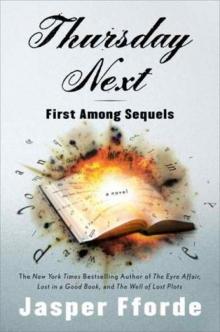 First Among Sequels
First Among Sequels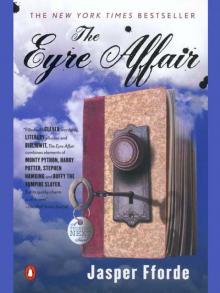 The Eyre Affair
The Eyre Affair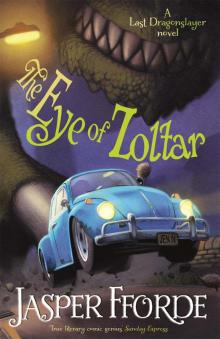 The Eye of Zoltar
The Eye of Zoltar The Woman Who Died a Lot
The Woman Who Died a Lot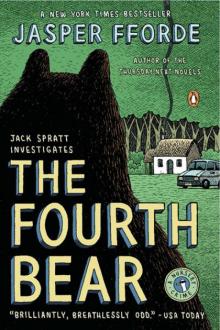 The Fourth Bear
The Fourth Bear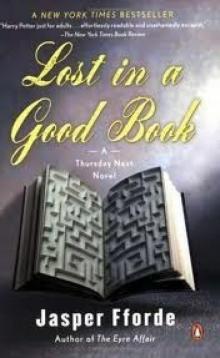 Lost in a Good Book
Lost in a Good Book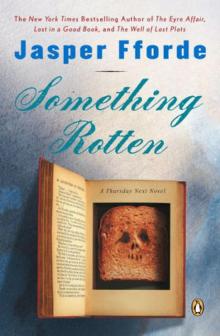 Something Rotten
Something Rotten The Well of Lost Plots
The Well of Lost Plots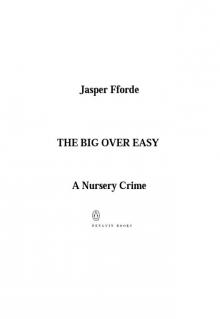 The Big Over Easy
The Big Over Easy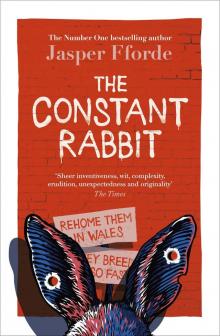 The Constant Rabbit
The Constant Rabbit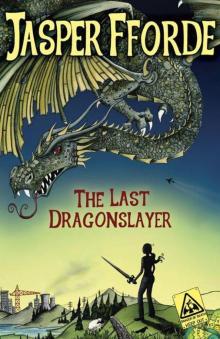 The Last Dragonslayer
The Last Dragonslayer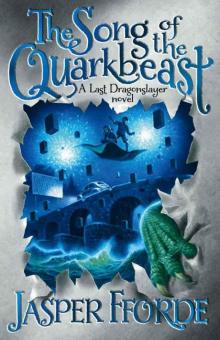 The Song of the Quarkbeast
The Song of the Quarkbeast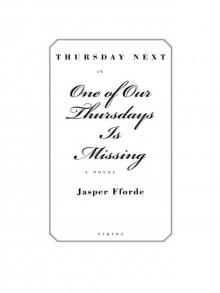 One of Our Thursdays Is Missing
One of Our Thursdays Is Missing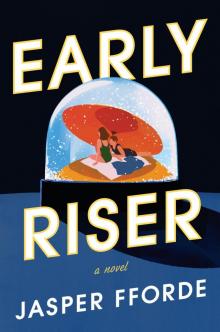 Early Riser
Early Riser Early Riser_The new standalone novel from the Number One bestselling author
Early Riser_The new standalone novel from the Number One bestselling author Something rotten n-4
Something rotten n-4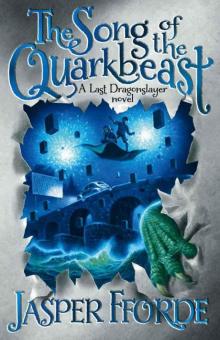 The Song of the Quarkbeast tld-2
The Song of the Quarkbeast tld-2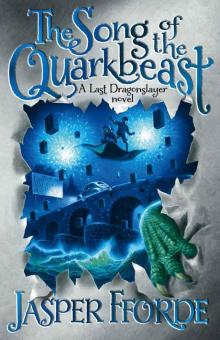 The Song of the Quarkbeast: Last Dragonslayer: Book Two
The Song of the Quarkbeast: Last Dragonslayer: Book Two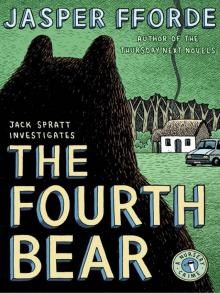 The Fourth Bear nc-2
The Fourth Bear nc-2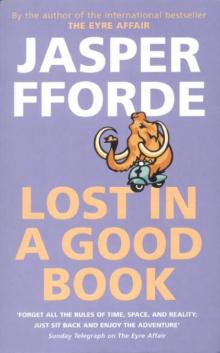 Lost in a Good Book tn-2
Lost in a Good Book tn-2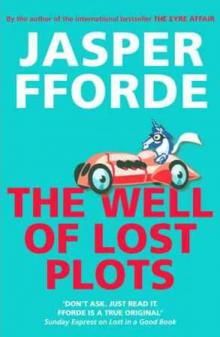 The Well of Lost Plots n-3
The Well of Lost Plots n-3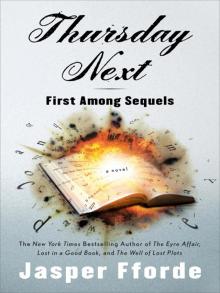 Thursday Next in First Among Sequels
Thursday Next in First Among Sequels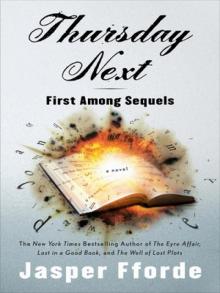 First Among Sequels tn-5
First Among Sequels tn-5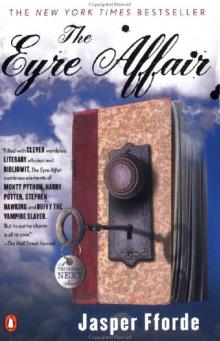 The Eyre Affair tn-1
The Eyre Affair tn-1